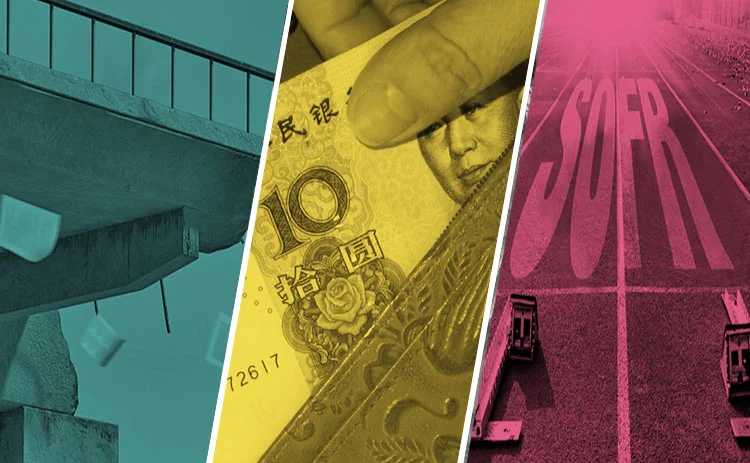
Chinese KYC, bankruptcy problems and SOFR swap clearing
Chinese KYC, bankruptcy problems and SOFR swap clearing

KYC concern slows asset managers’ move into China
Rush into $2.2 trillion China funds market tempered by problems obtaining client data
Bridge to nowhere: gaps in Treasury G-Sib bankruptcy plan
US bankruptcy-first approach needs more thought on emergency liquidity, say experts
LCH and CME to start clearing SOFR swaps in third quarter
Scramble to offer clearing aimed at cutting clients’ margin and capital costs
COMMENTARY: Headwinds for China
China’s recently launched yuan-denominated oil future could be only the first of many in Asia – but to the minds behind it at the Shanghai exchange, the important thing is no doubt that it is first, and represents another small step by China to stake out its own territory under the shadow of the almighty US dollar. There are many good reasons for companies in the Chinese energy sector – and other industries – to want the ability to hedge oil in their own currency and no doubt the Chinese government sees it as a good move to increase the popularity of renminbi as a global currency for both trade and reserve purposes.
The advantage to be gained here is more nebulous – it is doubtful what, if any, net advantage the US actually gains from the popularity of the dollar as the global reserve currency; seigniorage and the impact on the US government debt market are small and may even cancel out.
This week Risk.net covered the latest potential headwinds for Chinese progress this century. Foreign fund managers are being deterred from entering the country’s $2.2 trillion asset management market because of inadequate know-your-customer resources. This may not represent a crippling problem for Chinese growth in itself – the country is one of the largest recipients of foreign direct investment in the world, with inflows of $170 billion in 2016. But the net flow of funds is outwards, with $217 billion leaving the country in the same period.
It is a sign that KYC is becoming an increasingly arduous obligation for any country that wants to do business with other advanced economies – and that’s definitely something that should be worrying China.
Then there is the coming bad-debt crunch; yields are rising as the country’s shadow banking industry is choked off and regulators push established banks to deleverage. Foreign banks are getting wary of their China exposure, and with $2.7 trillion in debt coming due in the next two years, the scale of China’s bad debt problem will become clear very soon. A banking crisis will not help smooth the road to a post-US century.
STAT OF THE WEEK
The former chairman and general manager of Anbang Insurance, Wu Xiaohui, has been accused by the Chinese government of embezzling a total of 75.2 billion yuan ($11.99 billion) for improper usage of funds and insurance premiums. Monthly op risk losses: China’s Anbang faces huge fraud hit
QUOTE OF THE WEEK
“It would be a direct shot over the bows of Anna DSB if Isda was given that mandate. This would be for all derivatives and I don’t see how the Isin could survive” – chief executive of a post-trade technology firm on Isda’s potential challenge to issue unique product identifers
RISK QUANTUM
This week Risk.net launches Risk Quantum – data-based analysis and comment on derivatives, risk management and regulation, built on public disclosures and reports from institutions and regulators around the world
Further reading
Only users who have a paid subscription or are part of a corporate subscription are able to print or copy content.
To access these options, along with all other subscription benefits, please contact info@risk.net or view our subscription options here: http://subscriptions.risk.net/subscribe
You are currently unable to print this content. Please contact info@risk.net to find out more.
You are currently unable to copy this content. Please contact info@risk.net to find out more.
Copyright Infopro Digital Limited. All rights reserved.
As outlined in our terms and conditions, https://www.infopro-digital.com/terms-and-conditions/subscriptions/ (point 2.4), printing is limited to a single copy.
If you would like to purchase additional rights please email info@risk.net
Copyright Infopro Digital Limited. All rights reserved.
You may share this content using our article tools. As outlined in our terms and conditions, https://www.infopro-digital.com/terms-and-conditions/subscriptions/ (clause 2.4), an Authorised User may only make one copy of the materials for their own personal use. You must also comply with the restrictions in clause 2.5.
If you would like to purchase additional rights please email info@risk.net
More on 7 days in 60 seconds
Bank capital, margining and the return of FX
The week on Risk.net, December 12–18
Hedge fund losses, CLS and a capital floor
The week on Risk.net, December 5–11
Capital buffers, contingent hedges and USD Libor
The week on Risk.net, November 28–December 4
SA-CCR, SOFR lending and model approval
The week on Risk.net, November 21-27, 2020
Fallbacks, Libor and the cultural risks of lockdown
The week on Risk.net, November 14-20, 2020
Climate risk, fixing Libor and tough times for US G-Sibs
The week on Risk.net, November 7-13, 2020
FVA pain, ethical hedging and a degraded copy of Trace
The week on Risk.net, October 31–November 6, 2020
Basis traders, prime brokers and election risk
The week on Risk.net, October 24-30, 2020







